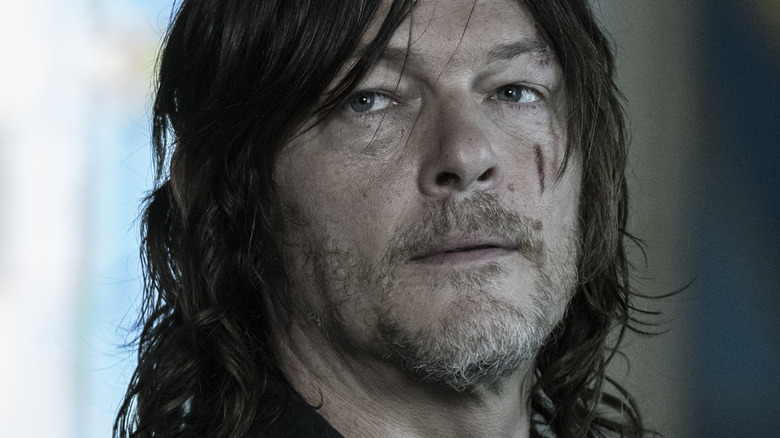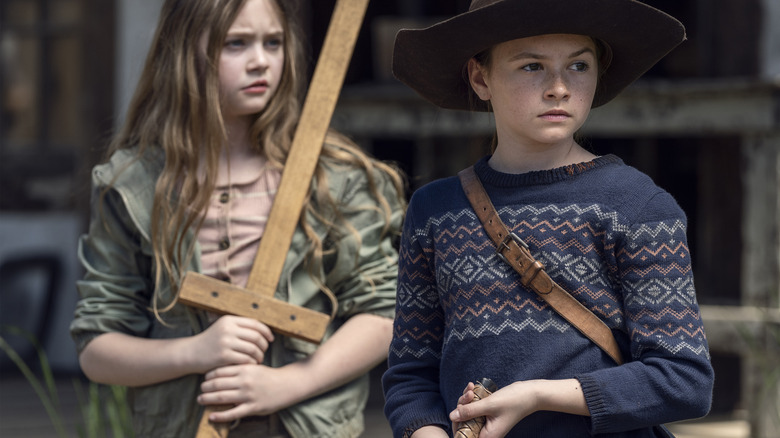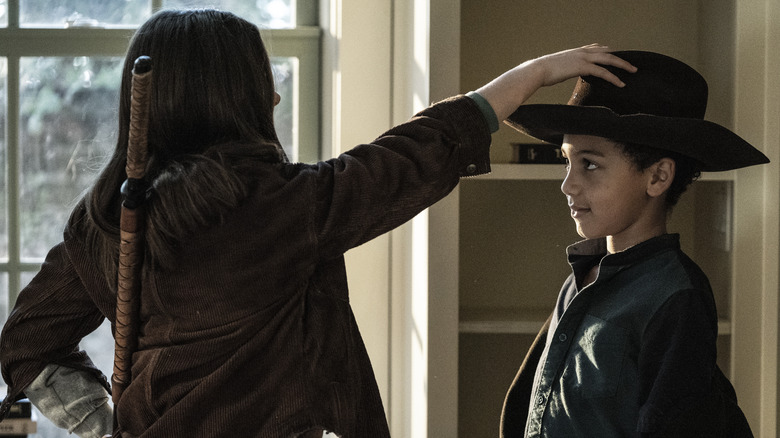The Walking Dead Series Finale Ending We'll Never Get To See
The following article contains spoilers for "The Walking Dead" Season 11, Episode 24 — "Rest in Peace"
After 11 seasons, "The Walking Dead" is finally resting in peace. The ending the program gave loyal viewers was nothing if not bittersweet — while the majority of its regulars survived, Rosita Espinosa (Christian Serratos), Luke (Dan Fogler), and Jules (Alex Sgambati) all succumb to walker bites. But the rest of the cast of characters thrive and find family, happiness, and romance. Their settlements grow in peace as well. The show's three upcoming spin-offs are set up, with Daryl Dixon (Norman Reedus) choosing to roam the country protecting others, Negan (Jeffrey Dean Morgan) taking off for New York City, and Rick Grimes (Andrew Lincoln) and Michonne (Danai Gurira) both seen fighting for their lives miles apart in completely different locations. Meanwhile, Judith Grimes (Cailey Fleming) and her half-brother, RJ (Antony Azor), continue to wait at Hilltop for their parents' arrival.
While this was an ending that definitely moved segments of the show's audience, it turns out that the show had planned an entirely different conclusion to the adventures of our intrepid survivors. It inspires hope for the future in a completely different way from the version which ended up airing and cements the survival of several "The Walking Dead" characters.
The show almost ended with a flash-forward
Per an article published by Insider, "The Walking Dead" was initially slated to end with a peek into the future. Greg Nicotero, an executive producer and director of the series, revealed during a Zoom call that the series finale we saw was not necessarily the planned series finale. "There was a scene that we had shot, but when it was decided to put the coda in we felt like it would conflict with the Rick and Michonne bit. So we took it out," he said.
Insider proceeded to confirm this deleted scene through two members of the show's crew, who preferred to remain anonymous. Per their information, the final scene would have taken us back to Atlanta, Georgia — specifically, Freedom Parkway, down which Rick Grimes infamously rode on horseback during the show's first episode. But this time, the characters traveling down the highway are in a van. The scene would be shot in such a manner as to reveal that these characters are now-grown Judith, RJ, and their friends. They are, just like their parents, apparently on a mission to rescue others from the apocalyptic battlefront and reunify disenfranchised communities. It's hinted that some progress has continued to be made technologically as well — the van apparently runs on ethanol.
This grown-up version of RJ speaks into a longwave radio. "If you can hear me, answer back. This is Rick Grimes." These words echo the same words that his father spoke in Episode 1. The radio crackles to life, and a voice calls out, "Hello?"
Why wasn't the ending used?
So why didn't we end "The Walking Dead" somewhere in the far-flung future? The crew members Insider spoke to gave reasons that dovetailed with Nicotero's — it didn't serve the franchise's future health. While one crew member said that ending the show with new versions of characters we weren't invested in didn't make sense, another mentioned that the original ending "was fitting, emotionally."
That unifying appropriateness stems from the fact that the comic book version of "The Walking Dead" also ends with a 25-year time jump. The focus of that final issue is Carl Grimes, who, of course, did not survive until the show's end in the television universe. While neither version places a neat bow on the show and leaves things open for further sequels, it's understandable why AMC felt the need to establish Rick and Michonne's upcoming sequel. Still, it's hard not to be curious about what could have been.


